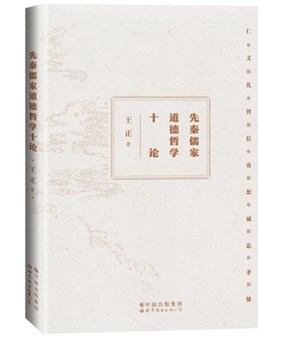
. > WHAT'S NEW > BOOKS
Reviewing pre-Qin Confucianism with problem-oriented approach
Author : PENG XIAOYUAN Source : Chinese Social Sciences Today 2022-12-20

Ten Distinctions of Pre-Qin Confucian Moral Philosophy
Ten Distinctions of Pre-Qin Confucian Moral Philosophy, by Wang Zheng, an associate professor of editorship from the Institute of Philosophy at the Chinese Academy of Social Sciences, asserts that if the development of pre-Qin (prior to 221 BCE) Confucian moral philosophy is presented in a manner similar to the history of traditional philosophy, it will inevitably be mechanically divided and deliberately demarcated, which will greatly reduce research breadth and depth. The author advocates returning to the problem-oriented awareness and approach of pre-Qin Confucianism.
Wang extracts 10 topics from pre-Qin Confucian moral philosophy: distinctions between heaven and man, man and animals, benevolence and justice inside or outside, benevolence and etiquette, righteousness and profit, groups and individuals, man of honor and man of disgrace, righteousness and destiny, moral governance and forceful governance, and Confucianism and Legalism. The author selects the discourses of Confucius, his disciples, Zisi, Mencius, Xunzi, and other pre-Qin Confucian representatives.
Whether the core of Confucian thought is benevolence or etiquette is still academically controversial. After detailed examination, Wang believes the former to be the case. For Confucius, benevolence was not only a fundamental and central concept, but also an extended and generalized category. It not only contains the basis of emotions and motives of will, but also includes the behaviors of morality and practices of politics. If people have not internalized benevolence and virtue, the ritual and music culture will be empty and ungrounded. Therefore, the establishment of benevolence, the inner moral subjectivity of human beings, is a prerequisite to other moral behaviors such as following etiquette. This concerns the construction of the entire moral and political ideological system of Confucius.
The book highlights the value of pre-Qin Confucian moral philosophy through making comparisons internally and horizontally, between ancient and modern, and between the East and the West. For instance, both Mencius and Xunzi differentiated between human beings and animals from the point of ethical relations. However, Mencius highlighted the intrinsically moral consciousness and value judgments embodied in human ethical relations, while Xunzi stressed the sense of distinctions and the standard of etiquette. These are specific differences under the affirmation of ethical relations. In fact, Mencius also had a clear awareness of the distinction of ethical roles, and proposed the “five cardinal relationships.” Similarly, Xunzi also gave an explanation of moral consciousness in ethical relations. In his view, the wicked lack moral consciousness, their hearts are like a tiger and a wolf, and their behaviors are bestial.
Peng Xiaoyuan is a professor from the Beijing Institute of Oriental Ethics at the Beijing Youth Politics College.
Ye Shengtao made Chinese fairy tales from a wilderness
Ye Shengtao (1894–1988) created the first collection of fairy tales in the history of Chinese children’s literature...
-
How northern ethnicities integrated into Chinese nation
2023-09-18
-
Mogao caves
2023-09-12
-
Mogao Grottoes as ‘a place of pilgrimage’
2023-09-12
-
Time-honored architectural traditions in China
2023-08-29
-
Disentangling the civilizational evolution of China
2023-08-28
-
AI ethics in science fiction
2023-08-23













 2011-2013 by www.cssn.cn. All Rights Reserved
2011-2013 by www.cssn.cn. All Rights Reserved